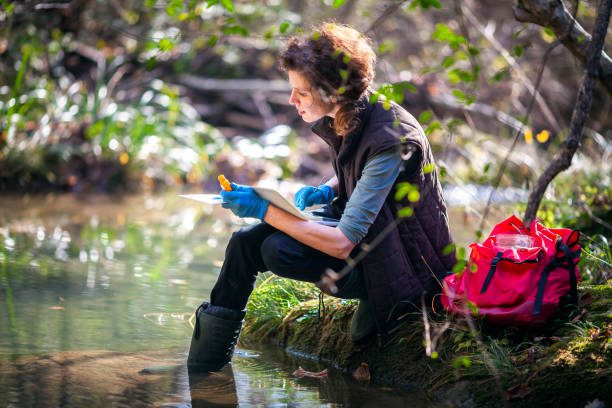
| Biologist Key Stats | |
|---|---|
| Education | 4+ Years |
| Job Outlook | 9% |
Biologists are trained professionals that spend their time observing and researching living organisms and wildlife.
Also known as Biological Scientists, the work that Biologists do includes the following: the studying of living organisms and wildlife.
The undertakings that Biologists take on in their career also have many benefits that positively influence other areas and industries.
The research and analysis these professionals do impacts other industries such as the medical, agricultural and industrial fields and ultimately affect consumers.
Students who want to become a Biologist have many options for employment as this profession has an impact on industries that impact consumers.
This impact has made this profession stand out as one that will undergo fast growth through 2018.
Table of Contents
Education Requirements to Become a Biologist
Education requirements to become a Biologist will depend on the advancement opportunities an individual is seeking.
For entry level positions, a candidate will have sufficient qualifications with an undergraduate degree and a focus in the sciences.
For individuals seeking work for an entry level position, a minimum of a Bachelor’s degree, or four years of college is a must.
The degree one must work towards is a Bachelor of Science, preferably with an emphasis on a science, such as Biology.
Acquiring a Bachelor of Science and emphasizing on classes such as Anthropology, Microbiology, Biochemistry and Molecular Biology will prepare students to apply for entry level positions.
A minimum of a Master’s degree is needed for individuals looking for advanced opportunities in applied research, product development, management or those seeking a high school teaching position.
Furthermore, those who want to become a Biologist and work in independent research or teach at the university level must work on attaining their doctorate degree in Biology or a closely related field.
Biologist Job Description
Biologists’ main duties are to increase the understanding of animals and plants to further gain an understanding of plant biology, genetics, the environment as well as animal biology.
The research and knowledge that Biologists glean from their research and fieldwork helps industries such as environmental preservation, conservation, medicine and even agriculture.
Specific tasks that Biologists performs depends on whether they work in the private or public sector.
For the most part, important tasks Biologists take is to understand how living organisms work, what they are made of and how they interact with their environment and surroundings.
Specific duties will also depend on whether a candidate is specializing in a specific organism.
For example, a Biologist can specialize in biochemistry, marine biology or zoology.
Whichever specialty an individual focuses on, a Biologist will split their time between observing living organisms and working additional hours in a laboratory doing research and analyzing their findings.
Doing field work will include observing and documenting a living specimen’s habitat, relationships with other wildlife and collecting samples from a specimen to do laboratory testing.
It can also include collecting plant material or other samples to return to a lab to perform more detailed tests on gathered samples.
As for laboratory work, Biologists will take samples under microscopes to design and carry out experiments, observations and finishing up by documenting their findings to publish in scientific literature or to complete reports.
Biologist Salary and Career Path
The 2012 median income for Biologists or Biological Scientists is $75,160 per year or $36.14 per hour across all industries.
Exact wages will depend on the industry or agency that a Biologist works for.
For example, the median wage for Biologists working for state governments is $54,070 per year while Biologists working for Medical Equipment and Supplies Manufacturing industry earn a median annual salary of $102,430.
The majority of Biologists find jobs in local, state or federal government agencies.
While some Biologists seek work from pharmaceutical companies and laboratories.
Agencies that hire the highest amount of Biologists tend to be government offices.
Future Biologists should expect a 21 percent increase in job openings through the year 2018.
Compared to other industries, this growth is considered above average.
The fast growth is attributed to an increasing health care industry, medical industry as well as preservation efforts from Eco-friendly groups.
Individuals seeking to become a Biologist have plenty of opportunities to succeed in this profession.
Whether an individual works for a government agency or a pharmaceutical company, students can assure that their love of science and animals will have a positive influence on other professions and industries such as health care.
In addition, future Biologists can be confident that their time will be well spent researching and observing animals for the greater good of preserving the environment.
![]() The below information is based on the 2023 BLS national averages.
The below information is based on the 2023 BLS national averages.
National Average Salary
$100,440* Employment conditions in your area may vary.
Frequently Asked Questions
What does a biologist do?
Biologists are scientists who study life (living organisms and their relationship to the environment).
In a nutshell, these scientists study bacteria, plants, animals, and humans to understand how nature works and how external factors can influence an organism.
There are different types of biology and scientists can work in microscopic or macroscopic biology, perform fundamental research or be involved in applied research.
There are ten sub-branches of biology that a biologist can choose to specialize in – anatomy, histology, morphology, physiology, ecology, embryology, cytology, taxonomy, genetics, paleontology, and biotechnology.
Of course, depending on the sub-branch, the main responsibilities of a biologist would vary.
Scientists can be employed by universities, private industry laboratories, and governmental agencies.
Biologists work as professors, in laboratories or outside in the field.
How much do biologists make?
On average, a biologist can make a little more than $77.000 per year in the United States.
In case you decide to follow this career path, you can expect to earn anywhere between $44.000 and $140.000 annually.
The salary would certainly depend on a variety of factors – your education and experience level, the employer, the location and so on.
An entry-level biologist can earn $21 per hour, while a specialist with plenty of experience will make $67 and more.
How much does it cost to become a biologist?
You would certainly need a bachelor’s degree in biology, in order to apply for an entry-level or a mid-level position.
A year in a university can cost you anywhere between $8.000 and $45.000 (and more); the cost depends on a variety of factors (the books, supplies, and accommodation expenses are not included).
However, the majority of employers will prefer you to have a master’s degree (over $11.000) or a doctorate degree, in case you want to become a professor or focus on independent research in biology (a Ph.D. will cost you around $20.000 per year).
What is the demand for biologists?
Between 2016 and 2026, the biologist job market is expected to grow by 9%, according to the Bureau of Labor Statistics.
That is a little faster than the national average for all occupations in the United States.
The public will become more interested in eliminating the hazards facing the environment and the living organisms of our planet in the near future, so more biologists might be required to focus on this field.
The candidates that hold a master’s or doctorate degree and have plenty of experience will have better job prospects.
How long does it take to become a biologist?
It will take you 4 years to obtain a bachelor’s degree and another 2 years to earn a master’s degree.
A doctorate degree typically takes 5-6 years to acquire.
Volunteering at various organizations and seeking internship opportunities will be extremely helpful for your future career.
The sooner you choose the branch of biology you want to focus on, the better.













